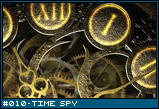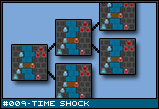| Three Hundred |
| - Index Page |
| - About... |
| - By Year |
| Collections |
| - Comp-Grid |
| - Procedural |
| - Tactics |
| - Tiny Crawl |
| - Misc |
| Previous | Mechanic #010 | Next |
Spawned by the same discussion as Mechanic #005 - Side Scroll Tactics, this one deals with time travel directly.
Sorry, no pictures this time. Words are better for the imagination anyway. This is a four player game, played with two teams. On each team is a commander and a spy. The commanders play a real time strategy game against each other. The whole game is recorded. Then, at some time in the future, the spy gets to play. He goes back in time to the beginning of the game and starts his play in the past of the commanders' game. The spy is an individual unit who may move around, but may not alter, the past. All the moves that previously happened will happen again. The spy's job is to perform his mission without being seen by those units, or changing the landscape in such a way as to affect the timeline. For instance, he can't push a rock onto the path if that path is eventually used sometime between that moment and the present, currently being played by the commanders. He can, however, move that rock if it does not matter to the timeline, and in the future, the rock will suddenly be at the new location. So, what is the spy's job? He has two. The first is that he can plant bombs on buildings or tanks. These bombs cannot blow up anything in the past (thus changing the timeline), but we can assume that the bombs remain undetected until the present, where they are suddenly available to the commander to detonate. The opponent commander can do bomb checks on the vehicles - if a bomb check is performed at some time in the timeline between when it has been placed and the present when it is detonated, it will be removed. So commanders should run routine bomb checks just to retroactively defend against sabotage that have already happened (but not). The second part of the spy's job is predictive. At the commander's disposal is a very powerful ability to simply say that enemy unit X already has a bomb on it. It may not have happened... yet. Now the timeline has a very specific point at which a bomb MUST be planted. Failing to plant the bomb before it is detonated will change the timeline (leading to an automatic being erased from the timeline and losing the match). The more the commander uses this powerful ability, the more agile the spy must be in order to reach the right places at the right time. Predicting a bomb that will be planted later is a very risky move. The spy can do other things, like hack the opponent's security systems, steal credits, drive the opponent's tanks, etc, but it all works the same way. The spy cannot drive a tank unless the commander has already made a prediction that the tank was being driven by a spy (thus the spy has to be sure to be in the tank at the right time, or boom). Either the spy plants something invisible that suddenly becomes useful in the present, or he must live up to the predictive needs of his commander. As such, working as an asymmetrical team is vital to victory. There is also a possibility that the spy could travel to the future. This would simply be a potential future that is based on the computer modeling it after the present. For instance, if the red team is researching nuclear tanks that will be finished in ten minutes, then if you jump ahead ten minutes, that technology will already have existed. Then the spy can steal the technology and bring it back for use in the present. Unlike the past, which is written in stone and cannot be changed, the future is not static, so even if the future is changed, like having the research building explode, that stolen technology remains (even if you stole it from yourself and blew up your own building). I haven't even mentioned the best part. There are two spies, one for each team. Somehow, they have to be on the same schedule (maybe they both go back to the same point in time, or they can only choose certain blocks of the past, which becomes locked after a spy has used it for a "turn"). Anyway, they could potentially be in the same time period at the same time, and while trying to avoid affecting the timeline, they are also trying to find and kill each other. To sum up, this is a stealth game. The spy's job is to not be seen. However, the level is dynamically based on what the players were doing ten minutes ago, and the mission objectives are set by the respective commanders up front, cementing the time limit and target to hit.
|


